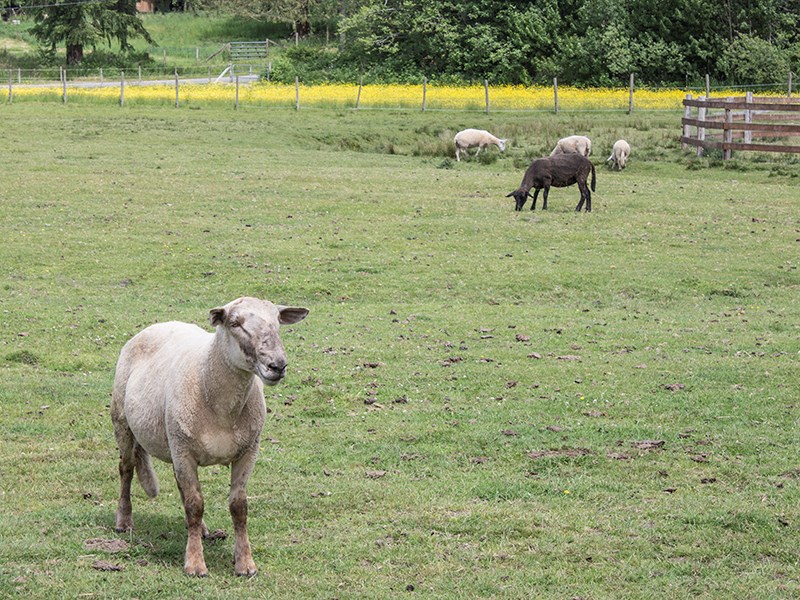An incubator farm, still in the early stages of development, will help increase the amount of local food available in the community and expose younger people to the agriculture industry, said City of Powell River economic development manager Scott Randolph.
The farm concept is bringing together local governments, School District 47, Vancouver Island University (VIU) and the community farming sector to tend the fertile idea.
“It’s about establishing a farm where people could lease small lots and learn the art and business of farming,” said Randolph.
He explained that boosting the number of small farms in the Powell River region is not a new concept and was brought up in a 2010 agricultural development plan and in last year’s economic development strategy.
Randolph told city council at its May 31 meeting that the partners are working with a consultant to form a business plan for the farm.
VIU Powell River campus administrator Greg Cran said the farm will be a benefit for local food production and give agriculture a boost.
“Our current farmer demographic is getting older and as a result there’s less land in production,” said Cran. “Younger farmers are the ones we would be attracting, but typically they don’t have the necessary skills, so this is an opportunity.”
VIU plans to create a continuing-education program around the incubator farm, said Cran.
According to Randolph, the overall objective of the program is to help new farmers reach a level of commercial viability so they can acquire larger plots of land to launch their businesses.
“We don’t have large tracts of arable land,” said Randolph. “If we are going to increase the number of farms, they are going to be smaller operations.”
The incubator itself is expected to be between 20 and 30 acres in size, said Randolph.
The project will provide small-lot leases, one to two acres in size, for a set period of time, between three and five years, for students to learn the basics of farming, said Randolph.
The location of the incubator has yet to be decided, but Randolph said its preferred location is within the residual agricultural reserve land that Sino Bright School BC (SBSBC) intends to purchase from PRSC Land Development, a corporation owned by the city and Tla’amin Nation, if that deal goes through.
That deal is contingent on whether the province’s Agricultural Land Commission agrees to exclude a 30-acre parcel within the PRSC land located next to Brooks Secondary School.
Sino Bright president Quan Ouyang sent the city a letter of support on Wednesday, June 1, for the incubator farm to be located next to the school’s planned future location.
“Please consider this letter as a firm commitment that SBSBC will provide the land necessary for the incubator farm project,” wrote Ouyang. “SBSBC understands that the farm project is important to the community of Powell River and is more than willing to play a part in making it a success.”
Other options for locations in the city also exist, said Randolph. The city also owns a 50-acre parcel of land zoned for agriculture between Penticton and Nootka streets. There is also potential to use a parcel of land just north of Wildwood.
While the trend in agriculture has seen the concentration of farmland into corporate agribusinesses become more mechanized and reliant on chemical fertilizers for higher yields, Cran said the focus of this program will be to teach farmers how to grow small-scale crops or raise animals for local niche markets.
“What we’re looking at is taking land that has been unproductive, put it back into becoming a source for the area and demonstrate that you don’t need to be super-sized to actually generate an income in farming,” said Cran.
Powell River has an approximate three-day supply of fresh food at any given time, said Cran. This program is about increasing supply and demand for local food and that will improve food security, he said.
Paul Schachter, secretary-treasurer of Society for the Advancement of Local Sustainable Agriculture, said his organization’s long-term goal is to help increase the amount and viability of locally produced farm products in the region.
“We need to prime the pump,” said Schachter. “The incubator farm can help do that.”
He added there is evidence that incubators, such as Haliburton Community Organic Farm in Victoria, have had that effect.
Powell River Farmers’ Institute and Powell River and District Agricultural Association are also supporting the project.
Once the incubator farm participants have a handle on the business, Randolph said they will then be able to access the financing needed elsewhere in the region to start their small businesses.
“This gives us the opportunity,” said Randolph, “to train the farmers of the future.”



